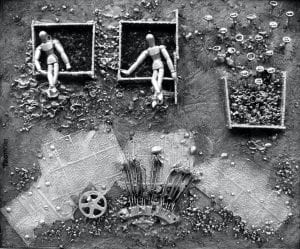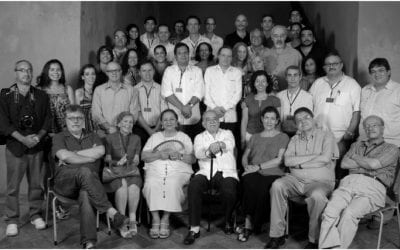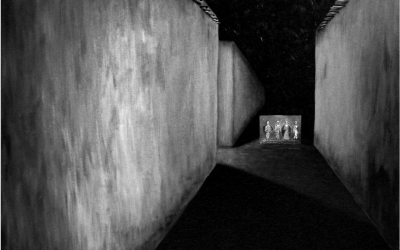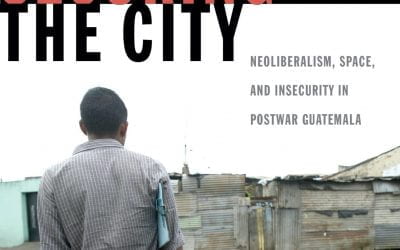Latin American Nieman Fellows
Portraying Journalism’s Realities
A few days after I arrived at Harvard in August 2000 to begin my work as curator of the Nieman Foundation for Journalism, Tim Golden, an investigative reporter for the New York Times in Latin America, phoned me. “Could I find a place in the new Nieman class for a Colombian journalist named Ignacio Gómez?” he asked.
Nacho, as Gómez was known to his friends, had fled his country in late May after a series of death threats and was living in exile in the United States. Golden explained that in Nacho’s work as an investigative reporter for El Espectador in Bogotá, he had linked paramilitary leader Carlos Castaño and Colombian military forces with the 1997 massacre of 49 people in the village of Mapiripán.
Nacho needs to find something useful to do while he is here, Golden said, and I can think of no better place for his talents than as a Nieman Fellow. “Can you do anything for him?”
I knew that Colombia was a dangerous place to be a journalist, but I had no idea how dangerous until I began to get familiar with Nacho’s background. Talking with him by telephone later that week, I sensed the depth of his passion for uncovering the truth no matter how great the risk.
Few of Colombia’s terrible secrets had escaped his notice. In almost two decades as an investigative reporter, Gómez had exposed alliances between drug lords and politicians, foreign mercenaries operating in Colombia, corrupt soccer teams, and the role of the Colombian military and paramilitary forces in many notorious massacres.
As I was learning about Nacho during those first days at Walter Lippmann House, I was also discovering that the Nieman curator has the authority to award a fellowship to journalists whose lives are in danger and who need a safe haven. A few weeks later, Nacho arrived in Cambridge to begin his Nieman Fellowship. It was an enriching experience for him and for the other 24 fellows in the Nieman class of 2001.
The story of Ignacio Gómez is an important starting point in understanding the value of the long relationship between the Nieman Foundation and journalists from Latin America.
My own experience in working with journalists from Latin America began years before I came to Harvard in my work as a newspaper editor. I attended Inter American Press Association meetings. I was involved in working with Latin American journalists in leadership roles in the American Society of Newspaper Editors, Associated Press Managing Editors and the Accrediting Council on Education in Journalism and Mass Communications. During the 1990s, while I was editor of TheDetroit News, I taught sessions on newsroom management to editors from Central America through a program administered by Florida International University. From 1997-2000, as executive director of the Freedom Forum’s Media Studies Center in New York, I traveled for seminars to Peru, Chile, Argentina and Panama. But none of these experiences brought me the intimate knowledge of the challenges faced by Latin American journalists as did getting to know Nieman Fellows from the region over the course of a year at Harvard.
The first Latin American Nieman Fellow was Robert Cox, editor of the Buenos Aires Herald, an English-language daily in Argentina, whose criticisms of the military dictatorship that ruled the country from 1976 to 1983 led to his brief detention in 1977.
Continuing threats against his family forced him to leave in 1979. He arrived at Harvard in the fall of 1980 as the first of 52 Latin American Nieman Fellows. More than a few Latin Americans and Latinos have now enriched the Nieman Foundation with their experiences as journalistic bridges between the United States and Latin America. The Nieman Fellowship program is the oldest and best-known mid-career program for journalists in the world. More than 1,300 journalists from the U.S. and 88 other countries have come to Harvard for a year of learning, exploration and fellowship since it was established in 1938. The estate of Agnes Wahl Nieman, whose husband, Lucius, founded the Milwaukee Journal, provided a gift of $1 million to Harvard in 1937 with a directive to “… promote and elevate the standards of journalism and educate persons deemed especially qualified for journalism.” The first international journalists were awarded Nieman Fellowships in 1951 and, in the years since, journalists from around the world have benefitted from the intellectual enrichment of Harvard.
Since 1995, the Latin American fellowships have been funded by grants from the John S. and James L. Knight Foundation. Some fellows, like Cox and Gómez, became targets after they exposed government abuses. Many have distinguished themselves as leaders in mainstream news organizations across the continent. Others are known as gifted story tellers. Still others have invested their innovative talents in startup enterprises in the online world. A few have moved into the public sphere, including Juan Manuel Santos, ’88, the current president of Colombia.
Such a diverse range of talents and experiences has brought to the Nieman community a rare perspective that has enabled U.S. fellows to see Latin America in a less U.S.-centric way. Latin American fellows have helped us understand that while they hold to the same high standards as their U.S. colleagues, journalism in Latin America can be dramatically different from that in the United States. They told chilling stories of working in dangerous places where a journalist or an editor does not always have the legal protections that U.S. journalists enjoy.
In Chile, for example, laws give judges, members of congress and other government officials immunity. Alejandra Matus, a Nieman Fellow in 2010, wrote a revealing book about the Chilean judiciary, The Black Book of Chilean Justice, which chronicled the “corruption, nepotism and abuses of power” in Chile’s justice system. The entire print run of the book was seized and, in 1999, Matus was charged under the State Security Law by which journalists could be jailed for five years for defaming senior officials. She fled the country until new legislation, introduced in 2001, allowed her to return from exile in the United States and resume her career as a journalist.
Alfredo Corchado, ’09, Mexico City bureau chief for the Dallas Morning News, won the 2010 Elijah Parish Lovejoy Award at Colby College in Maine, for his fearless coverage of the drug wars in Mexico.
In his acceptance speech, Corchado noted, “Mexico today is among the most dangerous places to do journalism in the world, right up there with Iraq, Russia and Somalia. This is especially true for those who cover the US-Mexico border, once a frontier for Mexicans seeking new opportunities and new beginnings.”
Corchado said he accepted the award “in the memory of the more than 60 Mexican journalists who have been murdered and dozens more who have disappeared since 2000, more than 30 in the past four years” (see p. 46 of print version).
In addition to defending press freedom with their lives, Latin American Nieman Fellows have been at the cutting edge of the digital revolution that is changing the nature of journalism everywhere. Juanita León, ’07, went to New York following her Nieman year as editor of flypmedia.com, a multimedia general interest magazine. The magazine did not survive, but Juanita’s experience with this startup convinced her that there is a role for specialized blogs.
She returned to Colombia to set up an investigative political blog called La Silla Vacía (The Empty Seat). She leads a staff of seven that directs the work of 60 unpaid contributors focusing their coverage on how power is exercised in Colombia (see p. 39).
Through his teaching at the University of Texas and his work with the Knight Foundation, Rosental Alves, a member of the Nieman class of 1988 from Brazil, has had a profound influence on journalism in Latin America. In 1991, he created an online, real-time finance news service, the first of its kind in Brazil. In 1994, Alves managed the launching of Jornal do Brasil’s online edition, making it the first Brazilian newspaper available on the Internet. At Texas, he created the Knight Center for Journalism in the Americas where he trains journalists in foreign correspondence and press freedom in the hemisphere.
Alma Guillermoprieto, ’05, has reported courageously and written brilliantly about Latin American reality for more than 20 years. She covered the insurrection against Anastasio Somoza in Nicaragua for the Guardian and broke the story of the massacre at El Mozote for the Washington Post. Her dispatches currently are published in the New Yorker, National Geographic and New York Review of Books. Her most recent book, Dancing with Cuba, is a memoir about teaching dance at the Escuela de Danza Moderna in Havana in 1970 that also examines the long history of the Cuban Revolution.
The experience of Hollman Morris forms a kind of bookend to my work with journalists from Latin America during my 11 years as curator of the Nieman Foundation. Hollman, an investigative television reporter from Colombia, was denied a visa by the U.S. government as he prepared to travel to Cambridge to begin his year as a member of the Nieman class of 2011.
During a heartfelt conversation over Skype late last June, Hollman told me the denial was based on accusations by the Colombian government linking him to the leftist guerrilla group FARC. His probing television reports had disclosed abuses by the country’s intelligence agency, angering the Colombian government. Particularly, he said, his travel to southern Colombia to interview senior FARC leaders for a documentary on kidnappings had raised suspicions.
What a paradox this seemed to be. A courageous journalist whose groundbreaking work had exposed him to persecution by his own government was being turned away by the United States, with its longstanding commitment to press freedom worldwide.
With extraordinary help from the Committee to Protect Journalists, whose mission is to come to the aid of journalists worldwide, and Human Rights Watch, a coalition quickly emerged that would pursue every angle to get this unjust decision reversed. When the news that Hollman had been denied a visa first broke in an AP dispatch from Bogotá, stories, columns and editorials followed. Thoughtful, persuasive letters went to the White House and State Department. Nieman Fellows wrote to express outrage and ask what they could do. I called on members of the Nieman class of 1988 to contact their classmate, Juan Manuel Santos who was about to be inaugurated as president of Colombia.
This collective effort worked. By late July, Hollman, who had taken his family to Spain for security reasons, was asked by the State Department to return to Bogotá where he received his visa.
Several weeks later, fully launched into his Nieman year, he sent me an e-mail noting the “marvelous things” that have happened, “like seeing my kids going by themselves to the park in front the house without bodyguards. We see them playing every day from the window and for the first time we are not afraid that something could happen to them.”
Spring 2013, Volume XII, Number 3
Bob Giles will retire as curator at the end of the Harvard school year in June 2011. He was a Nieman Fellow in 1966 and, over a long newspaper career, edited newspapers in Akron, Ohio; Rochester, New York; and Detroit. He became curator in 2000.
Related Articles
New Journalists for a New World
I received a surprising phone call one day in late 1993, when I was the director of Telecaribe, a public television channel in Barranquilla, Colombia. The caller was none other than Gabriel García Márquez. “Will you invite me to dinner?” he asked me. “Of course, Gabito,” I…
Freedom of Expression in Latin America
In June 1997, Chile’s Supreme Court upheld a ban on the film “The Last Temptation of Christ,” based on a Pinochet-era provision of the country’s constitution. Four years later, the Inter-American Court of Human Rights heard a challenge to this ban and issued a very different…
Securing the City: Neoliberalism, Space, and Insecurity in Postwar Guatemala
Guatemala City is a difficult place to live, much less to love. Smoke-belching buses clog its arteries, lurching past shantytown-lined ravines, down once-grand boulevards, and through the hardscrabble neighborhoods of the working poor, against which the glitz of the…





